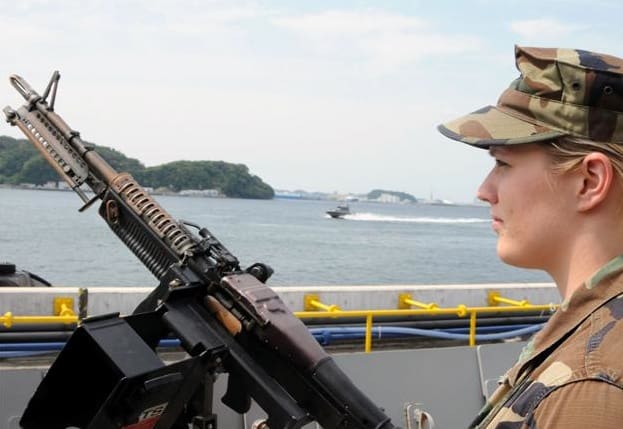Ever heard of the Biggest Guns Theory? If I can kill you faster or more impressively than you can kill me, you won’t try to kill me. In the words of Iron Man, “That’s the way America does it, and it’s worked out pretty well so far.” President Theodore Roosevelt’s favorite saying, imported from tribal Africa, worked along the same lines: “Speak softly and carry a big stick.” Seems like in the past year and a half or so, China has been speaking softly and looking to break America’s biggest stick in half.
President Roosevelt, who had written a naval history and was even Secretary of the Navy, was a big naval guy. His idea of the Biggest Gun was the biggest Navy. It makes sense, considering that most countries who have both the capabilities (which excludes Mexico) and the desire (which excludes Canada) to attack the U.S. have an ocean to cross. So when he became President, he commissioned the expansion of the U.S. navy and the creation of the Great White Fleet.
World War Two saw the U.S. Navy establish her world supremacy. Since then, at least on the surface of the ocean, the Navy has been largely unchallenged in a face-to-face fight. The symbol of the Navy’s power is the aircraft carrier, which is essentially the Biggest Gun in all of history. The carrier is one of the main reasons that most countries would not consider waging a conventional war against the United States. And now the aircraft carrier is under attack.
The Epoch Times reports that China has introduced to the world the Dong Feng 21D, a missile capable of destroying a carrier 900 miles offshore. It is being designed specifically for destroying carriers. Hopefully, China puts as much effort into the production of this missile as they do into our Wal-Mart goods, but I get the distinct feeling that this won’t be the case.
To be perfectly honest, it scares me that China is developing an anti-carrier weapon. There is absolutely no reason for them to do so unless they foresee an event where a) they create reason for the United States to intervene (such as an attack on Taiwan or other American interests), or b) open war with the United States. If anyone can think of a different reason, I would love to hear it. Because the way I see it, this is a direct attack on a country that, while imperfect (look at who we elected president), generally looks out for the good guys.
Now China is arming itself with the technology to produce a DF-21D, proving Comrade Vladimir Lenin’s words prophetic: “The Capitalist will sell us the rope with which we will hang them.” Or in this case, we sold them the bullets they will use to shoot at us. Somehow I don’t think Teddy Roosevelt would have made the same mistake.





Imagine that you have always maintained a big community profile while your persnickety neighbors have kept to themselves. Then they start getting out more, making connections and in short, doing all the things that you have been doing. How can you really criticize that?
http://www.foreignpolicy.com/articles/2010/08/04/panda_hugger_hangover
I suspect that China has grown too fast to remain content within its borders. They can no longer afford to leave their hinterlands to the vagaries of drought and famine. They see that even in economic distress, the US maintains a blue-water Navy that extends its power around the world. Africom has to concern the Chinese, who are staking out agreements with food and oil-producing areas around the world. So they are doing what we have done for over a century.
Comments are closed.